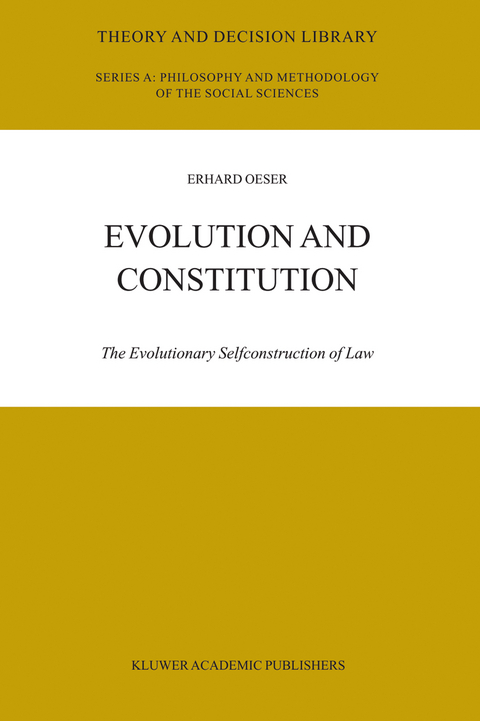
Evolution and Constitution
Springer-Verlag New York Inc.
978-1-4020-1784-1 (ISBN)
Evolutionary approach to law had been advocated already at the time of Darwin by English ethnologists of law like Sumner Maine and American anthropologists like Morgan. The present work is an attempt to apply evolutionary thought to the continental legal philosophy and juristic methodology. Although in the 19th century the idea of an evolution of law was present also on the continent it was burdened with reproaches of social Darwinism (proved nowadays as unreasonable). Grounds for the negotiability of evolutionary approach to complex social systems are provided by the latest research in evolutionary theory of cognition and evolutionary ethics as well as by the theory of complex systems in the sense of Friedrich von Hayek.
This book provides a profounder (conformable to the biological theory of evolution) explanatory basis not only for anthropology and history of law but also for juristic methodology. In addition it offers a practical model of juristic argumentation processes, illustrated by many examples.
Preface.- 0: Philosophy and Jurisprudence. 0.1. The Three Classical Dimensions of Legal Philosophy. 0.2. The Traditional Basic Controversy (Natural Law Versus Legal Positivism) and Contemporary Approaches to it. 0.3. Summary and Preview.- 1: Legal Philosophy as Methodology. 1.1. Jurisprudential Concept of Science and the Position of Jurisprudence in the System of Sciences. 1.2. The Basic Types of Scientific Method. 1.3. Structure of Scientific Knowledge. 1.4. Classification of Sciences and the Position of Jurisprudence. 1.5. Model of the Functional Context of Juristic Methods. 1.6. Summary: the Open System Of Law.- 2: Legal Philosophy as a Developmental Theory of Law. 2.1. Legal-Philosophical Relativism. 2.2. The Theory of Socio-Cultural Evolution As Frames of a Developmental Theory of Law. 2.3. Approaches to an Evolutionary Theory of Development of Law.- 3: The Theoretical Model of a Deeper Argumentation. 3.1. The Meta-Theory of Juristic Argumentation. 3.2. Expansion Towards Historical-Genetic Dimension: Historical Discourse. 3.3. Extension Towards a Legal-Ethical Theory of Principles. 3.4. Rational Self-Construction of Law. References. Index.
| Erscheint lt. Verlag | 30.11.2003 |
|---|---|
| Reihe/Serie | Theory and Decision Library A ; 37 |
| Zusatzinfo | 42 Illustrations, black and white; XI, 212 p. 42 illus. |
| Verlagsort | New York, NY |
| Sprache | englisch |
| Maße | 155 x 235 mm |
| Themenwelt | Geisteswissenschaften ► Philosophie |
| Medizin / Pharmazie | |
| ISBN-10 | 1-4020-1784-7 / 1402017847 |
| ISBN-13 | 978-1-4020-1784-1 / 9781402017841 |
| Zustand | Neuware |
| Informationen gemäß Produktsicherheitsverordnung (GPSR) | |
| Haben Sie eine Frage zum Produkt? |
aus dem Bereich


